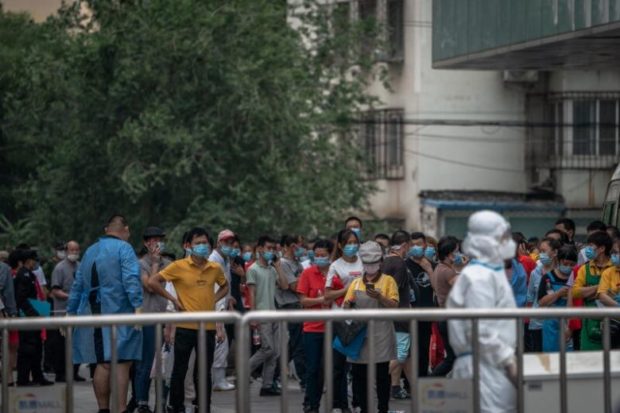
Beijing has ordered an increasing number of people to undergo tests to check for the virus. EPA-EFE via The Straits Times/Asia News Network
BEIJING — Just past 8am on Sunday (June 21) morning, homemaker Cai Meijuan woke her husband and five-year-old daughter so they could join a growing queue that snaked across their residential compound in east Beijing.
At the front of the line were workers in full white protective suits, gloves and goggles, standing behind tables, armed with tongue depressors and cotton swabs to retrieve samples from the bottom of residents’ throats.
The family were among nearly a thousand residents of the Haiyuncang Hutong in the low-risk Dongcheng district who had been ordered to undergo swab tests for the coronavirus.
In a bid to assuage public concerns amid the recent outbreak, Beijing has ordered an increasing number of people to undergo tests to check for the virus. It has mobilized an army of some 7,000 medical staff and volunteers, allowing up to half a million samples to be taken daily.
This is despite top government scientists repeatedly emphasizing that mass testing would not be necessary for the city of over 20 million.
Laboratories have been struggling to keep up with processing the samples, creating a massive backlog, with results taking as long as 10 days to be returned.
Beijing on Monday reported nine new coronavirus cases, bringing the total number of infections in this latest outbreak to 236.
The cases so far are people who either visited the Xinfadi Wholesale Market, or were close contacts of those who were there.
When new coronavirus cases first surfaced at the market in south Beijing earlier this month, the authorities ordered all workers and stallholders, as well as those living in the market’s vicinity, to be tested. About 11,000 people were called up.
But with the Xinfadi market supplying up to 80 per cent of the city’s fruits and vegetables, there were concerns that the virus could have spread along the food supply chain. All other markets across Beijing were also ordered to shut for cleaning and disinfection, and vendors, too, had to be tested for the coronavirus.
Since then, the tests have also been made compulsory for restaurant workers and food handlers, ride-hailing drivers, deliverymen and medical staff.
The city massively upped its swab testing capacity, saying that by last Saturday, it could take 500,000 samples a day.
But with the city’s nucleic acid testing capacity only at about 230,000 daily, even with labs running round the clock, this has created a massive backlog, with many facing up to a one-week wait for results.
Ten medical teams are reinforcing the capital city, adding another 30,000 capacity, while scientists are exploring batch testing – meaning up to five samples are mixed and tested at the same time – which could increase capacity to one million a day, Beijing authorities said at a press conference on Sunday.
The authorities have also built a makeshift bio lab at the Peking Union Medical College Hospital which started operating on Monday, the hospital said on its social media page without elaborating on the capacity.
The government has also called on residents to “be rational” about tests, saying that only those from high-risk areas or who are planning to leave the city need to be swabbed, and to make an appointment.
Some neighborhood committees, like Madam Cai’s, however, would rather err on the side of caution despite being located about 25km away from Xinfadi.
“It’s not that much trouble, we just queued for about 20 minutes, I was chatting with my neighbors and the process was over in less than a minute,” the 32-year-old told The Straits Times.
“After that, I could go to the market and continue with my day normally. But I suppose it offers peace of mind.”
Separately, a Beijing shopping mall owned by Singaporean developers CapitaLand was shut after two confirmed coronavirus patients went shopping there.
The CapitaMall Grand Canyon in the Fengtai district, the same area where the Xinfadi market is located, has been shut for cleaning and disinfection, the Beijing Commercial Daily newspaper reported.

